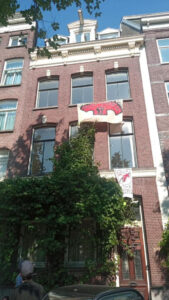 In 2010 the squatting ban was introduced. In theory, this law was created to criminalize squatting whilst fighting against houses being empty. In reality, its purpose was to please some politicians and their questionable neoliberal agenda. We see that there is no political will to fight emptiness, the local governments never put any effort into finding the owners that keep their houses empty. This law has only been used to evict squatters and make them homeless, while still many houses are left empty. In June 2022, another new law has been put into practice. It had as its goal to shorten the time span between the announcement of eviction and the moment of the actual eviction. By doing this they take away the rights of the squatters to legally defend themselves. Now after one year of this law existing in Amsterdam, we feel the repression. We are worried about how the hearings are going and how unjust their practice is. The way squatters are being evicted now is not through a court case but through a criminal hearing. The judge commissioner (RC) is the one to decide if the squatters will be evicted or not. To get all the information for the case, the RC invites the officer of justice who is an investigator cop, her name is Petra van Laeren. There is nobody to witness how these hearings go, it is not a public court case so no media or people interested in the case can be there. We, the squatters in Amsterdam, are starting to see that these hearings are a joke of justice. We figured out that there is a connection between the RC and the officer of justice, showing that they know each other better than just from the court. In the hearings, intimidation is going on, cops are waiting in front of the room to take pictures of the squatters. It is the same people taking the same decisions all the time behind closed doors and the decisions are not publicly posted. It is unfair that we have to blindly go to these hearings under their conditions. To not have an audience, no media, nothing is published. It is a blur of what goes on in these office rooms and how the decisions are being made. Justice is out of balance and we are mad about it. [Read More]
In 2010 the squatting ban was introduced. In theory, this law was created to criminalize squatting whilst fighting against houses being empty. In reality, its purpose was to please some politicians and their questionable neoliberal agenda. We see that there is no political will to fight emptiness, the local governments never put any effort into finding the owners that keep their houses empty. This law has only been used to evict squatters and make them homeless, while still many houses are left empty. In June 2022, another new law has been put into practice. It had as its goal to shorten the time span between the announcement of eviction and the moment of the actual eviction. By doing this they take away the rights of the squatters to legally defend themselves. Now after one year of this law existing in Amsterdam, we feel the repression. We are worried about how the hearings are going and how unjust their practice is. The way squatters are being evicted now is not through a court case but through a criminal hearing. The judge commissioner (RC) is the one to decide if the squatters will be evicted or not. To get all the information for the case, the RC invites the officer of justice who is an investigator cop, her name is Petra van Laeren. There is nobody to witness how these hearings go, it is not a public court case so no media or people interested in the case can be there. We, the squatters in Amsterdam, are starting to see that these hearings are a joke of justice. We figured out that there is a connection between the RC and the officer of justice, showing that they know each other better than just from the court. In the hearings, intimidation is going on, cops are waiting in front of the room to take pictures of the squatters. It is the same people taking the same decisions all the time behind closed doors and the decisions are not publicly posted. It is unfair that we have to blindly go to these hearings under their conditions. To not have an audience, no media, nothing is published. It is a blur of what goes on in these office rooms and how the decisions are being made. Justice is out of balance and we are mad about it. [Read More]
Amsterdam: open call in solidarity with Villa Fuerte hearing
Utrecht: squatted floors on the Oudegracht 106-108 illegally evicted
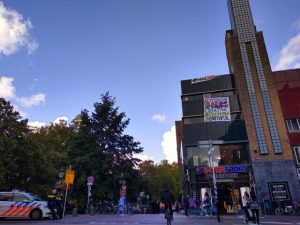 Utrecht (Netherlands) – Late Saturday evening the police nevertheless proceeded with an illegal eviction to protect the interests of the owner Caron Realestate & Management BV.
Utrecht (Netherlands) – Late Saturday evening the police nevertheless proceeded with an illegal eviction to protect the interests of the owner Caron Realestate & Management BV.
Earlier in the day, squatters had announced that they had been using the upper floors for several days.
In response, the police responded accordingly, and an officer of justice explained to the owner that a procedure will be initiated, that he could file a complain and have his arguments for a possible urgent case reviewed by the investigation judge.
This is a new procedure to get squatters out of a property faster that went into effect on July 1, 2022. [Read More]
Utrecht: neccesity breaks law
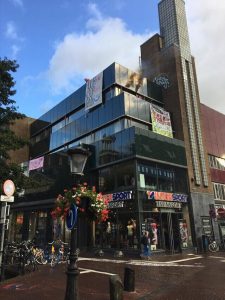 Squatted buildings in central Utrecht to celebrate 12 years of squatting ban
Squatted buildings in central Utrecht to celebrate 12 years of squatting ban
Utrecht (Netherlands) – On October 1, 2022, exactly 12 years after the Squatting and Vacancy Act (Wet Kraken en leegstand) came into effect, the office spaces above the Intersport on Oudegracht 106-108 were squatted. The squatters aim to demonstrate that squatting is still a legitimate option in addressing and combating the housing crisis and homelessness. Although the law is supposed to combat vacancy, vacancy rates have only increased since the squatting ban. At the same time, there is an unprecedented housing crisis, which means that people searching for a house are on waiting lists, miss out on houses because investors outbid them and, when they do manage to get a house, have to work their asses off to pay the rent. This while squatting and the squatting movement have been criminalized and persecuted. [Read More]
Utrecht: Building on the Archimedeslaan resquatted
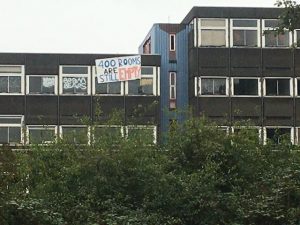 On October 1, 2021, exactly 11 years after the Kraken en Leegstand (squatting and vacancy) law came into force, the buildings on the Archimedeslaan 16 were resquatted. The squatters protested against the continuing vacancy of the former student housing. Although the law should prevent vacancy, the vacancy rate has only increased since then. This while squatting and the squatting movement have been criminalized and prosecuted.
On October 1, 2021, exactly 11 years after the Kraken en Leegstand (squatting and vacancy) law came into force, the buildings on the Archimedeslaan 16 were resquatted. The squatters protested against the continuing vacancy of the former student housing. Although the law should prevent vacancy, the vacancy rate has only increased since then. This while squatting and the squatting movement have been criminalized and prosecuted.
The squatters want to show that squatting is still a legitimate option in addressing and fighting the housing crisis and homelessness. Indeed, squatting still serves as an effective tool against speculators and housing corporations who use houses as tools to make a profit. The squatters wonder why, in times of a real housing crisis, the development of houses is delegated to profit-oriented organizations. [Read More]
Netherlands: New Squatting Law. Squat Wars IV, Return of the squatting ban
The Dutch government recently passed a new law, Wet Handhaving Kraakverbod (or law to Enforce the Squatting Ban), with the aim of evicting squatters more quickly. There is a lot of confusion and uncertainty about what exactly this law will entail and especially what influence this will have on squatters and their housing rights.
Unfortunately, this text will not be able to answer all questions since this law has been written by politicians who see squatting as a terrible thing and want to get rid of it, without actually seeming to have much understanding of the legal protocols and procedures. The result is a law that says that from now on, squatters must be evacuated more quickly without clearly establishing exactly how this should work. Both the Public Prosecution Service, the Council of Judiciary and Bond of Lawyers strongly criticised the proposal and called for this law not to be adopted, nevertheless a large majority voted in favour and this law entered into effect on 19 May, 2021. [Read More]
Netherlands: Actions against the ban on squatting
 This year, October 1st marks the ten year anniversary of the Squatting Ban coming into effect in the Netherlands.
This year, October 1st marks the ten year anniversary of the Squatting Ban coming into effect in the Netherlands.
Much like what we saw in the UK following the criminalisation of squatting in 2012, the repercussions have been drastic for our community and our movement. We’ve been pushed out of city centres, drastically reducing our visibility and contact with the public outside our own community. The number of squats across the country has been divided by ten, and the legal risks surrounding squatting have risen. Perhaps most damaging of all, our community is sorely lacking in participation from a “new generation”. A large number of people in that age group are totally oblivious to the concept of squatting.
Since the squatting ban came into effect, homelessness has doubled. Simultaneously, waiting lists for social housing have grown enormously, the average waiting time being nine years. The total lack of affordable housing constitutes a housing crisis which, since 2020, is being referred to as a housing emergency. [Read More]
Netherlands: Actions after 10 years of squatting ban
 10 Years On! And you still can’t live in a waiting list!
10 Years On! And you still can’t live in a waiting list!
Today, October 1st, 2020 marks the 10 year anniversary of the criminalisation of squatting in the Netherlands through the Kraken en Leegstand (Squatting & Emptiness) law.
Despite the law, kraken gaat door (squatting continues).
On the face of it, the law was created to end both squatting and emptiness. It has done neither. Buildings are still empty and for many people squatting remains a necessity. After all, it is not the existence of empty buildings that leads to squatting, but rather the lack of accessible housing.
Whether you are squatting, renting, or looking to buy a home, finding an available (let alone affordable) house is a struggle. [Read More]
Amsterdam: New Policy. No Eviction for Emptiness…
 As a squatter in Amsterdam, looking back on the past year is painful. 2019 dealt heavy blows to a movement that didn’t seem capable of much more than taking the beating. The city has lost its largest squats and despite numerous squatting actions, hardly any new buildings have survived the end of the year. What’s more, politicians tried to introduce a law at national level to further criminalise squatters while the media reported time and time again how afflicted property owners are being deceived repeatedly by squatters. To top it all off, the mayor concludes the year with a report on a new policy designed to implement a more rigorous approach to squatting.
As a squatter in Amsterdam, looking back on the past year is painful. 2019 dealt heavy blows to a movement that didn’t seem capable of much more than taking the beating. The city has lost its largest squats and despite numerous squatting actions, hardly any new buildings have survived the end of the year. What’s more, politicians tried to introduce a law at national level to further criminalise squatters while the media reported time and time again how afflicted property owners are being deceived repeatedly by squatters. To top it all off, the mayor concludes the year with a report on a new policy designed to implement a more rigorous approach to squatting.
There’s not much left to say beyond 2019 having been a rather grim year, making it difficult to paint a hopeful picture for squatting in Amsterdam in 2020.
We look back on a year in which we, above all, lost a lot. [Read More]
Groningen: Statement by Akerkstraat squatters to the council
Dear Councillors,
As the people who live in Akerkstraat 16a we are pleased to be able to speak at this needed debate about the housing shortage among students, mostly internationals, in Groningen. It is clear to us that this is a matter of urgency. Every year thousands of international students are lured to the city to come and study here. What should have been a wonderful time in a beautiful city turns out to be a tragedy for many of them, just as this year. There are not enough houses, especially ones that are affordable, in the city to accommodate all those students. At this moment hundreds of students are in the emergency shelter they are expected to leave at the end of this month. Most of them have not yet found alternative housing. [Read More]
Utrecht: Derelict buildings squatted out of housing shortage and protest against vacancy
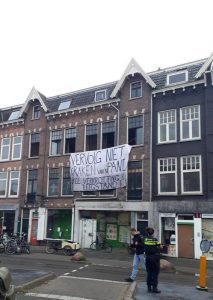 Since last weekend, a group of young people have been living in the long since vacant houses at the Burgemeester Reigerstraat 48-53 in Utrecht.
Since last weekend, a group of young people have been living in the long since vacant houses at the Burgemeester Reigerstraat 48-53 in Utrecht.
The occupation is both a direct approach to a need for life – the young people are looking for housing – and a protest against the current housing policy. The action, part of a national wave, criticized Squatting and Vacancy Act from 2010 and the intention to tackle squatting even harder. “The residents are of the opinion that not squatting, but vacancy and housing shortage must be tackled”, according to a spokesman. The buildings on Burgemeester Reigerstraat have been vacant for more than five years. Owner Marcel Paping plans to demolish the four buildings and build four new buildings and retail space in their place. A parking garage is to be built under the buildings. He has the permits for his plan, except for the entrance to the basement. Many neighbours are of the opinion that a large underground car park will seriously disturb the peace and quiet in the street. Paping plans to nail up the empty buildings if the Municipality does not grant him all the permits. Half a year ago, the buildings were also squatted. Then the police went on a wrongful eviction. “Hopefully this time the police will be wise enough not to go for the owner’s trolley and go the right way”, says one of the squatters. [Read More]
Amsterdam: Oops we did again! Amstel 45 squatted.
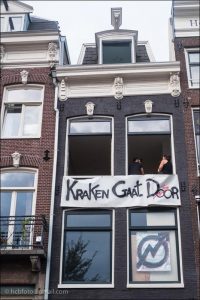 Sunday, 22-09-19 we successfully squatted the building at Amstel 45. The owner of this building is the biggest real-estate owner of Amsterdam and an speculator. There have been buildings owned by Veldhuijzen squatted before, Amstelkade 20 (2016), Admiraal de Ruijterweg 76 (2008). Johannes Cornelis Martinus Veldhuijzen is the owner of 512 properties in Amsterdam, he has more buildings on his name than Prince Bernhard van Oranje Nassau! (see for details the Parool article mentioned below). We know the building has been empty for 2 years and currently there is a building stop, which means the owner is prohibited to work on the building any further and he also doesn’t have any plans for the building at this moment.
Sunday, 22-09-19 we successfully squatted the building at Amstel 45. The owner of this building is the biggest real-estate owner of Amsterdam and an speculator. There have been buildings owned by Veldhuijzen squatted before, Amstelkade 20 (2016), Admiraal de Ruijterweg 76 (2008). Johannes Cornelis Martinus Veldhuijzen is the owner of 512 properties in Amsterdam, he has more buildings on his name than Prince Bernhard van Oranje Nassau! (see for details the Parool article mentioned below). We know the building has been empty for 2 years and currently there is a building stop, which means the owner is prohibited to work on the building any further and he also doesn’t have any plans for the building at this moment.
We are against vacancy, leaving buildings empty and left to rot, and we squat because of vacancy! During the first week of occupation, we didn’t have any contact with the owner. Wednesday the 26 of September, we received the court papers for a fast civil procedure. His story had a lot of inconsistency and no concrete plans and because of this and the new squatting law that is coming, we decided it’s a good time to fight back! We went to court on the 1st of October and now we are waiting for the verdict, the 15th of October. The owner himself did not show up in court and he still has shown no willingness to communicate with us in any way. Will keep you guys updated!
[Read More]
Groningen: Former Heijkens building squatted by students
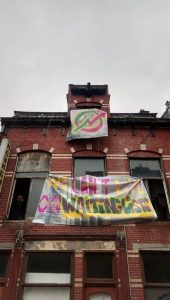 A few days ago, a group of students occupied the former Heijkens building on Akerkstraat. The youngsters who are looking for housing are trying to raise the issue of the national housing shortage. The squatting action is part of a national campaign in the context of the nine-year squatting ban. “During this time, it was mainly squatters who had to suffer, while landowners and speculators get away with vacancy. So the ban is not a solution to the housing shortage”, according to the students’ spokesman.
A few days ago, a group of students occupied the former Heijkens building on Akerkstraat. The youngsters who are looking for housing are trying to raise the issue of the national housing shortage. The squatting action is part of a national campaign in the context of the nine-year squatting ban. “During this time, it was mainly squatters who had to suffer, while landowners and speculators get away with vacancy. So the ban is not a solution to the housing shortage”, according to the students’ spokesman.
Since 1 October 2010, the Squatting and Vacancy Act applies. The purpose of this law was to reduce the vacancy rate in the Netherlands. However, research commissioned by the Ministry of Security and Justice and the Ministry of the Interior shows that the effects of the vacancy policy are hardly visible. At the beginning of this year, some 96,500 m² of office space was vacant in the city of Groningen, half of which is not even for rent or sale. The vacancy rate of office buildings in the Netherlands has almost doubled. [Read More]
